
A flippant, frivolous man may ridicule others, may controvert
A flippant, frivolous man may ridicule others, may controvert them, scorn them; but he who has any respect for himself seems to have renounced the right of thinking meanly of others.






In the words of Johann Wolfgang von Goethe, "A flippant, frivolous man may ridicule others, may controvert them, scorn them; but he who has any respect for himself seems to have renounced the right of thinking meanly of others." These words carry with them the weight of ancient wisdom, urging us to recognize that the true measure of a person's dignity lies not in their ability to degrade or dismiss others, but in their capacity for respect and self-discipline. Goethe calls upon us to consider the virtue of humility, for to look down upon others is not a sign of strength but of inner weakness—an inability to honor the deeper values of respect, understanding, and compassion.
The ancients often spoke of the relationship between self-respect and how one treats others. The philosopher Socrates is famously quoted as saying, "Know thyself," a call to recognize one's own worth before passing judgment on the worth of others. This idea was foundational to the teachings of Socrates, who emphasized that a person with a strong sense of self-respect would never engage in the flippant ridicule of others. Socrates understood that those who resort to scorning others are often hiding their own inner turmoil, for the truly wise and virtuous person is one who extends respect to all, understanding the inherent dignity of every human being. Goethe’s words reflect this ancient ideal, asserting that to respect oneself is to renounce the baseless practice of belittling others.
Consider the tale of Marcus Aurelius, the Roman emperor and philosopher, who in his Meditations often spoke of the importance of treating others with respect, regardless of their station in life. Aurelius knew that self-respect was not a matter of vanity but of humility. As the ruler of the vast Roman Empire, he could have easily looked down upon his subjects, but he chose instead to acknowledge their humanity and treat them with kindness. Aurelius believed that to mock or scorn others was not only a display of weakness but a contradiction of his own teachings on virtue. His life serves as a reminder that true greatness lies in lifting others up, not in putting them down. Goethe’s wisdom echoes this sentiment, reminding us that only those who lack true respect for themselves seek to diminish the worth of others.
The notion that one who respects oneself cannot engage in mean thoughts about others is also deeply rooted in the teachings of Confucius. The great Chinese philosopher believed that respect for oneself and for others was the cornerstone of a harmonious society. In Confucianism, the cultivation of virtue begins with self-awareness and self-discipline, and this inner strength naturally leads to the respect of others. A person who harbors ill thoughts or degrades others, according to Confucius, has not yet mastered the most important virtue: respect. For in true self-respect, one understands that all people, regardless of their status or position, are deserving of dignity and compassion.
Throughout history, we have seen this principle at play in the lives of great leaders who embodied respect and humility. Abraham Lincoln, the 16th President of the United States, was known for his remarkable ability to treat his adversaries with respect, even in the midst of the most trying times. Despite the intense political division and personal animosities of the era, Lincoln would never resort to the scornful or mean-spirited tactics that were common among some of his contemporaries. His respect for others, even those who opposed him, won him the admiration and loyalty of many. Lincoln’s example, like that of Marcus Aurelius and Socrates, demonstrates that a person of true strength does not need to belittle others to prove their worth.
The lesson of Goethe’s words is clear and vital for our times: true greatness and strength lie not in the ability to mock or degrade others, but in the capacity to show respect and kindness to all, regardless of their status or circumstances. A person with self-respect does not feel the need to elevate themselves by putting others down. Instead, they recognize that all people are worthy of dignity, and in doing so, they elevate themselves through their actions. Respect is not a commodity that can be traded or diminished—it is a core virtue that multiplies as it is shared.
In our daily lives, let us reflect on this wisdom. When we find ourselves tempted to scorn or belittle others, we must ask ourselves: "Am I acting with the self-respect that will guide my actions toward others?" True strength is found in the humility that comes from recognizing the inherent worth of every person. Let us strive to embody the virtues of respect, kindness, and humility that Goethe and the ancients revered, for in doing so, we become the leaders of our own lives—leaders who inspire and uplift, rather than tear down. May we walk the path of integrity and respect, leaving behind the petty divisions of the world and embracing the shared humanity of all.






AAdministratorAdministrator
Welcome, honored guests. Please leave a comment, we will respond soon